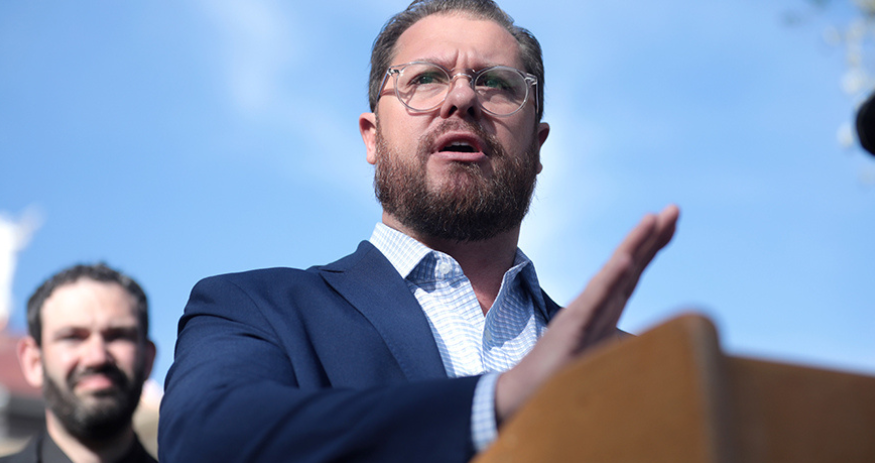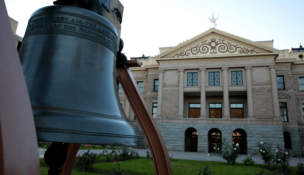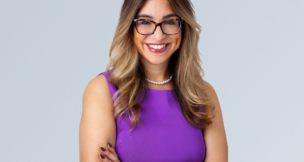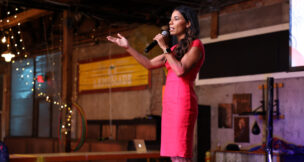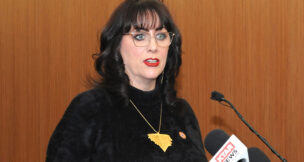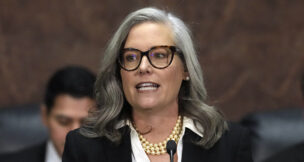GOP senator tries to get Green Party candidate in TV debate
Hannah Elsmore Arizona Capitol Times//October 2, 2024//
GOP senator tries to get Green Party candidate in TV debate
Hannah Elsmore Arizona Capitol Times//October 2, 2024//
A Freedom Caucus senator is still pressing to include a Green Party candidate in the U.S. Senate debate, which is just one week away.
The ongoing feud between Sen. Jake Hoffman, R-Queen Creek, and the Citizens Clean Elections Commission is centered around their decision to require that candidates receive at least 1% of the total ballots cast in all primaries to participate in general election debates.
The commission partnered with the Arizona Media Association for broadcasting during the election cycle, and the two decided on the rules that would govern the debate season.
The rule excluded Green Party candidate Eduardo Quintana from the U.S. Senate debate between candidates Kari Lake, a Republican, and Ruben Gallego, a Democrat. Quintana fell significantly short of the requirement, with about .02% of the total primary votes cast.
In a letter to the commission on Tuesday, Hoffman asked the Clean Elections Commission to submit their general election candidate qualifying rule to the Governor’s Regulatory Review Council after he alleged that the commission “acted outside of its scope of authority by attempting to create legislative policy excluding candidates from participating in public debates.”
Specifically, Hoffman said the “1% Debate Exclusion” rule was adopted by the commission without the opportunity for public comment that is required under the Arizona Administrative Procedures Act.
Executive Director Tom Collins said the commission had acted within its right to make a “discretionary decision” by enacting the rule.
He said the commission had “reasonably exercised its delegated discretion to limit who may participate in a particular debate based on threshold criteria determinations it deems necessary given the input it received from its contracted/broadcast consultants,” in a letter sent to Hoffman on Sept. 12.
Collins compared Quintana to a Libertarian candidate who was allowed to participate in a CEC debate in 2022. Collins noted that Quintana had not registered a campaign committee with the Federal Elections Commission, going on to state that “it did not appear that he qualified as a ‘candidate’ for purposes of the Commission debate rule.”
Hoffman called the CEC’s letter a “because-I-said-so response completely devoid of legal merit.”
“Arizona law only gives the Commission discretion to determine the manner in which debates are conducted,” Hoffman said in the letter. “It does not, as your letter contends, give the Commission unfettered discretion to pick and choose which candidates get to participate. Arizona law is clear. The Commission is required to ‘[s]ponsor debates among candidates.’”
Hoffman said that the state’s law regarding candidacy varies from the federal requirements.
“Under Arizona law, a person can be a candidate for a public office as long as they expend or receive a single cent,” Hoffman said.
AMA President and CEO Chris Kline said the rule would not be changed ahead of the upcoming debate, in part, because most had already taken place and it would be unfair to the previous candidates to change the regulation.
“Our goal is to be as inclusive as possible, but also to make sure that these debates are seen and engaged with by as many people as humanly possible, and it’s a delicate, complicated balance to strike, which is why we try to create the lowest possible threshold,” AMA president and CEO Chris Kline said. “We built this rule as part of the new partnership, as the best opportunity we could come up with to be fair and inclusive. We live in a world of changes every day, and we want to ensure that we continue to talk to lots of folks, and we are staying as nimble as humanly possible, but I don’t have another solution.”
Kline said he does not imagine the 1% threshold for general election debates lowering in the future, but noted that not having a solution now “doesn’t mean that it’s not a part of the conversation.”
Despite Hoffman’s request, all signs from the commission and AMA indicate that they plan to follow through with Lake and Gallego as the debate’s sole participants.
“Clean Elections is reviewing Sen. Hoffman’s lengthy letter,” CEC said in a prepared statement. “Clean Elections will continue to engage with Sen. Hoffman regarding this issue and looks forward to a spirited debate next week.”
Hoffman said the commission should have “nothing to fear from holding an open and public process for promulgating rules” if it views the rule as a good idea.
“Evading this process invites litigation, calls into question the independence of the Commission, and deprives Arizona citizens of the protections afforded under the APA,” Hoffman said.
However, he has not said whether or not he plans to take further action if the rule is not scrapped ahead of the debate, which is scheduled for Oct. 9.

